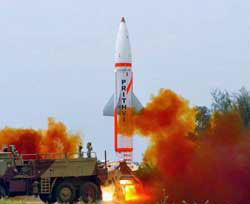
New Delhi, June 24: Delhi and Mumbai, the two most vital metros of India, have been chosen for DRDO's Ballistic Missile Defence system that can be put in place at short notice.
The detailed proposal is being prepared for final clearance from the Cabinet Committee on Security (CCS).
The strategic planning has already begun to install the BMD system in the two cities and the final proposal will be put before the government after detailed analysis of the entire project, sources have told PTI.
The sites for installing radars to track enemy missiles and storing counter-attack projectiles will be determined during the planning stage, they said, adding that these locations must have adequate stealth feature and protection against enemy sabotage.
To ensure maximum protection against air-borne threats, DRDO will put a mix of counter-attack missiles which will be able to shoot down enemy missiles both within earth's atmosphere (endo-atmospheric) and outside it (exo-atmospheric).
The BMD system will require minimum human intervention due to the complete automation of tracking devices and counter-measures. Human intervention will be required only to abort the mission, the sources said.
After successful implementation in Delhi and Mumbai, the system will be used to cover other major cities in the country, they added.
The shield, developed by Defence Research and Development Organisation, has undergone a series of successful tests. It can destroy an incoming ballistic missile with the range of up to 2,000 km.
During the test stage, DRDO used variants of Prithvi missiles as simulated targets and successfully intercepted them in mid-air.
All the necessary elements such as long-range radars and tracking devices, real-time datalink and mission control system required for installing the BMD missile system have been also been successfully tested by the DRDO.
The system is all set to be upgraded to the range of 5,000 km by 2016.
The system was first test-fired in November 2006, elevating India into the elite club of countries to have successfully developed an anti-ballistic missile system after the US, Russia and Israel.





Comments
Add new comment